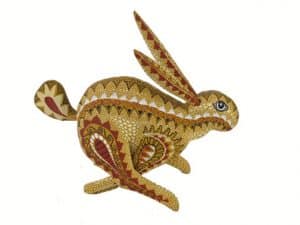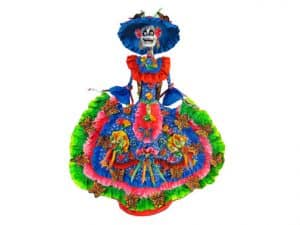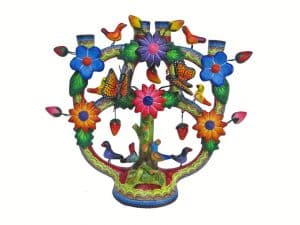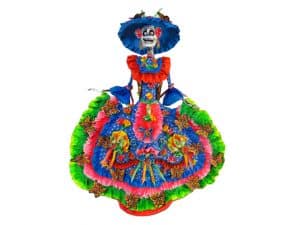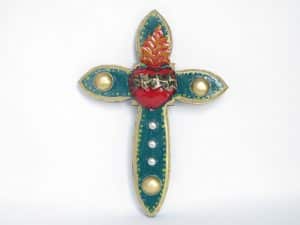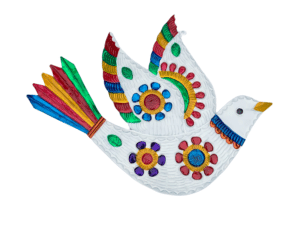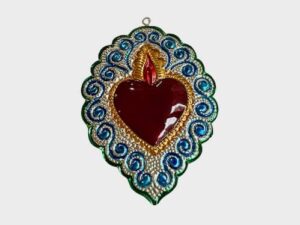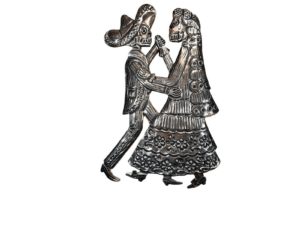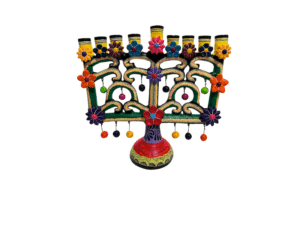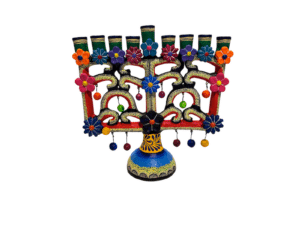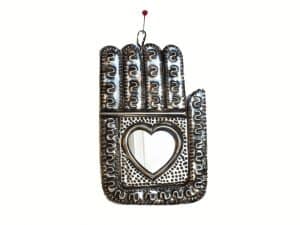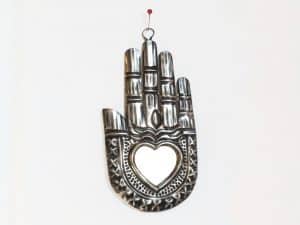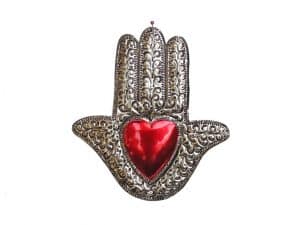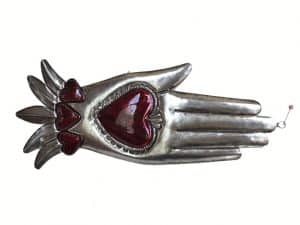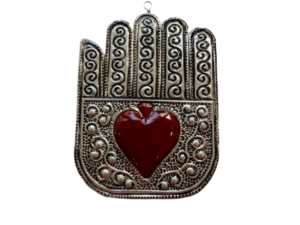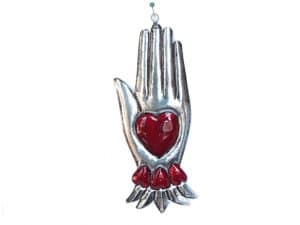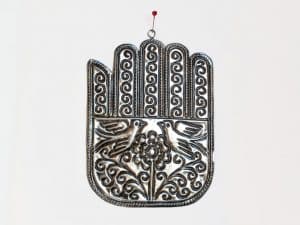Hamsa Hands/Heart In Hands
The Radiance of Tin Art
Tinwork is one of Mexico's oldest crafts. Rooted in Spanish colonial times, tinplate workers manufactured it by dipping thin sheets of iron into molten tin. This coats the iron with a bright, durable surface that is resistant to rusting. Our tin figures are entirely handmade (cutout, punched, embossed and soldered) by craftsmen using great precision and artistic flair. Painted with bright, durable lacquer and enamel colors, tin figures are inexpensive, lightweight and long lasting. In modern Mexico, the two centers of tin smithing are Oaxaca and San Miguel de Allende, and we carry products from both cities.
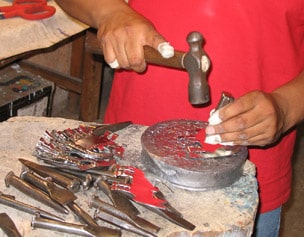
Your Title Goes Here
Your content goes here. Edit or remove this text inline or in the module Content settings. You can also style every aspect of this content in the module Design settings and even apply custom CSS to this text in the module Advanced settings.
Read More About Hamsa Hands/Heart In Hands
In this section of our Mexican tin art collection, we bring you Hamsa Hands, also known as Hand of Fatima or Khamsa hands. They are ancient Middle Eastern talismans or charms that symbolize the Hand of God. It is a protective sign, bringing the owner good luck, good health and good fortune. We also present what we call Heart In Hands; these are not in the true Hamsa Hand design. Our tin hands are all handcrafted by tinsmiths in Oaxaca, Mexico.
Please take the time to browse our other tin products, including animal figures, birds, Day of Dead, Christmas ornaments and tin stars, nicho frames and fridge magnets. Use the drop-down menu above, under TIN ART.
The age of tinwork in Mexico goes back at least to the 1700s. Tin was originally manufactured by dipping thin sheets of iron into molten tin to coat them with a bright surface that was durable and highly resistant to rusting. (However, if the surface is scratched, revealing the iron underneath, it will begin to rust if exposed to rain or high humidity.) For an artisan, the appeal of working with tin is its lightness, strength and low cost. It is easily bent, cut and soldered to form intricate shapes.
In eras gone by, Mexicans decorated their homes with tin photo frames, candelabras, lanterns, tin and glass frames (nichos) holding pictures of saints. In humble churches, tin crowns were set on the heads of statues, lit tin lanterns were carried during processions, tin candlesticks adorn the altars.
Tinwork is often referred as the poor man’s silver. In Mexico, every religious and festive object handcrafted in silver has a counterpart in humbler forms made from tinplate. Yet the same degree of skill and passion the silversmiths put into their work could be found in the less opulent pieces made by tinsmiths. Their pieces, too had an alluring shine, that charming brilliance.
These days, tinsmiths in Oaxaca and San Miguel de Allende are carrying on the traditions, making Christmas decorations, tin soldiers, heart-shaped wall plaques and a variety of clever toys. Most of their work is for export to the southern United States, where tinwork is one of the most visible manifestations of Mexican Culture. Most popular with American collectors are the cheerful, flat ornaments, of which we have many here at Viva Oaxaca Folk Art. Take a look and enjoy.
Showing all 12 results
-
Embossed Hand With Mirror
Size: 4.5 inches tall
This Embossed Hand With Mirror features square-shaped hand with embossed design and a heart shaped mirror. It is unpainted and silver colored. It has a loop for hanging on a wall or use it as an ornament. Handmade in Oaxaca.
SKU: TN-1_011$6.50 -
Hand and Heart Mirror Ornament
Size: 5 inches tall
The Hand and Heart Mirror Ornament features an embossed hand with a heart shaped mirror in the center of the palm. Unpainted with an intricate embossed design. It has a loop for hanging; use as wall decor or as an ornament. Made in Oaxaca.
SKU: TN-1_013$6.50 -
Hand with Cross and Heart-Shaped Mirror
Size: 5.5 inches tall
Hand with Cross and Heart-Shaped Mirror features a silver open hand with a cross atop of the center finger and a deep red heart in the center of the palm. Handmade in Oaxaca.
SKU: TN-1_025$6.25 -
Heart In Palm Embossed Ornament
Size: 5.5 inches tall
This Heart In Palm Embossed Ornament features a deep red heart surrounded by an embossed design. Made in Oaxaca.
SKU: TN-1_032$5.95 -
Heart In Hamsa Hand Embossed Ornament
Size: 8.5 inches tall x 6.5 wide
This Heart In Hamsa Hand Embossed Ornament can be used an ornament or wall decor. Shaped in the traditional Hamsa Hand design and features an embossed design with a red heart centered in the palm. Handmade in Oaxaca by the Aquino Family Tinsmiths.
SKU: TN-1_076$12.50 -
Heart in Hand Ornament
Size: 9.5 inches tall
This Heart in Hand Ornament (Mano Con Corazón, Grande) features an unpainted silver hand with a centered deep red heart and small deep red hearts around the wrist. Large enough to be used as wall decor or as a large ornament. Created by Conrado Villegas Alcazár.
SKU: TN-2_100$24.50 -
Hamsa Hand Embossed with Heart Ornament
Size: 5 inches tall
The Hamsa Hand Embossed with Heart Ornament features an unpainted and heavily embossed design on the hand with a red heart centered in the palm. Handcrafted by Aquino Family tinsmiths in Oaxaca.
SKU: TN-1_077$5.95 -
Hand With Hearts Magnet
Size: 2.5 inches tall
The Hand with Hearts Magnet features an open hand with a red heart centered in the palm and tiny hearts around the wrist. Handcrafted in Mexico by the Aquino Family Tinsmiths.
SKU: TN-9_45$4.25 -
Heart in Hand Ornament
Size: 5 inches tall x 3 inches wide
The Heart in Hand Ornament features beautifully detailed embossed tin, antiqued finish, with a sacred heart painted red in the hand’s palm. Handmade in Oaxaca by Mujeres Artesanas De Las Regiones De Oaxaca.
SKU: TN-1_027$5.75 -
Hamsa Hand With Heart
Size: 5.25 inches tall x 4 inches wide
The Hamsa Hand With Heart (Manos de Fatima con Corazón) Ornament is a chunky design. It features an engraved swirling design on the fingers an a raised swirling design on the palm. A red heart is centered in the palm. Handmade by Conrado Villegas Alcázar.
SKU: TN-1_014$12.50 -
Small Heart In Hand Ornament
Size: 6 inches tall
This Small Heart In Hand Ornament features an upheld hand with a red heart in the palm and small red hearts around the wrist. Handcrafted tin art by Conrado Villegas Alcazar in Oaxaca.
SKU: TN-2_069$7.75 -
Hamsa Hand with Birds Ornament
Size: 5.25 inches tall
Hamsa Hand with Birds Ornament features punched tin with embossed design of a flower and two birds. Unpainted and left its silver color. Handcrafted by Conrado Villegas in Oaxaca.
SKU: TN-1_010$12.50



